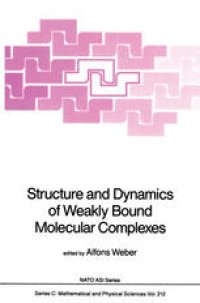
Ebook: Structure and Dynamics of Weakly Bound Molecular Complexes
- Tags: Physical Chemistry
- Series: NATO ASI Series 212
- Year: 1987
- Publisher: Springer Netherlands
- Edition: 1
- Language: English
- pdf
The study of weakly bound molecular complexes has in recent years brought this field of investigation to the forefront of physical and chemical research. The scope of the subject is wide and different terminology and nomenclature is current among the various subspecialties. Thus, the term "metal cluster" often connotes to the organic chemist a metal-organic compound, while the physicist will more likely think of groups of metal atoms held together by weak interatomic forces. Aggregates, clusters, complexes, van der Waals molecules, hydrogen-bonded molecules, etc. are terms currently in use, sometimes interchangeably while other times with well defined and mutually exclusive meanings. The subjects of this volume are the free, isolated vim der Waals and hydrogen-bonded molecules. Owing to the present state of experimental knowledge these are mostly dimers, i. e. , entities formed by two strongly bound molecules, an atom and a molecule, or two atoms held together by the weak hydrogen-bonding, or the still weaker van der Waals forces. Weakly bound complexes formed of more than two strongly bound sub-units, i. e. , trimers, tetramers, etc. , are now coming within reachof experimental observation and several papers in this book deal with them. The study of van der Waals and hydrogen-bonded interactions has been pursued for several decades. Most of these ,investigations have, however, dealt with systems in the condensed phase in which bulk effects are commingled with and therefore mask the weak binary interactions.